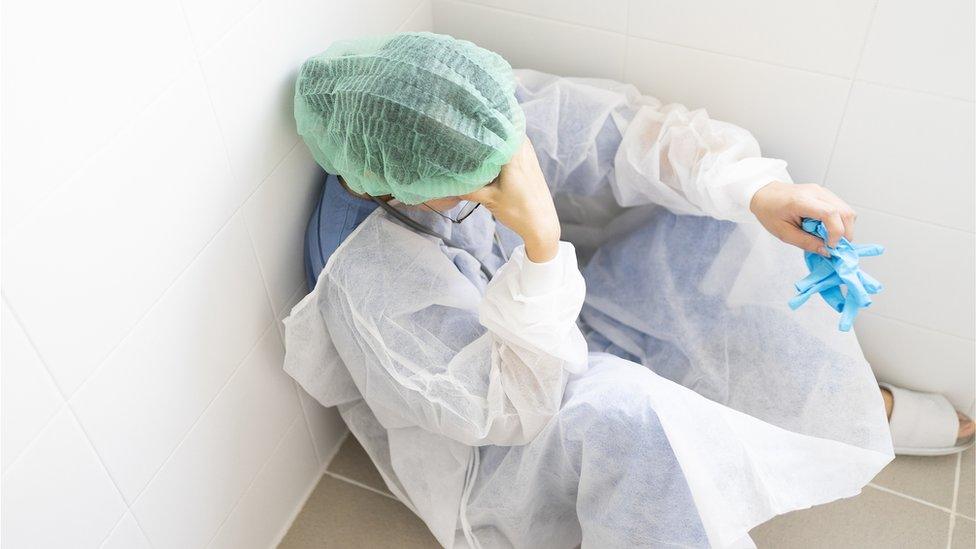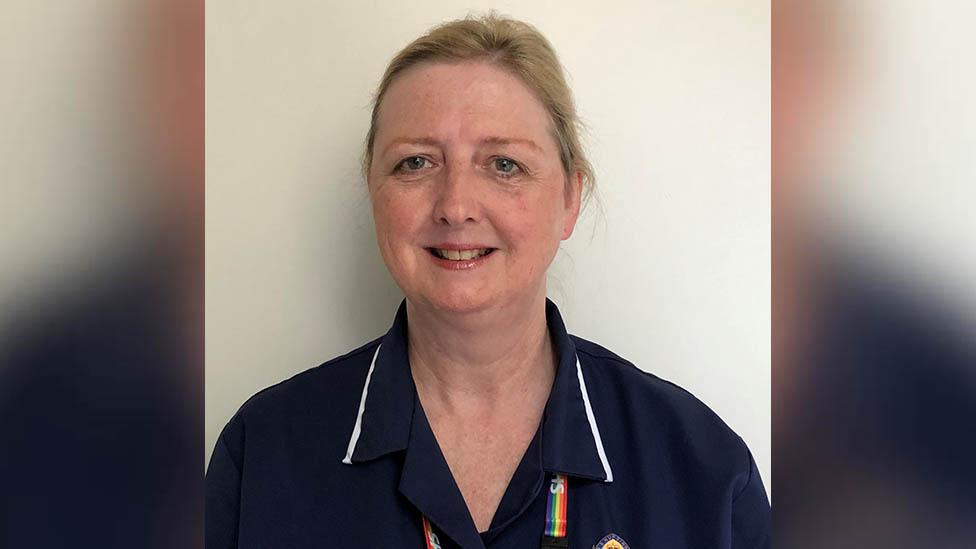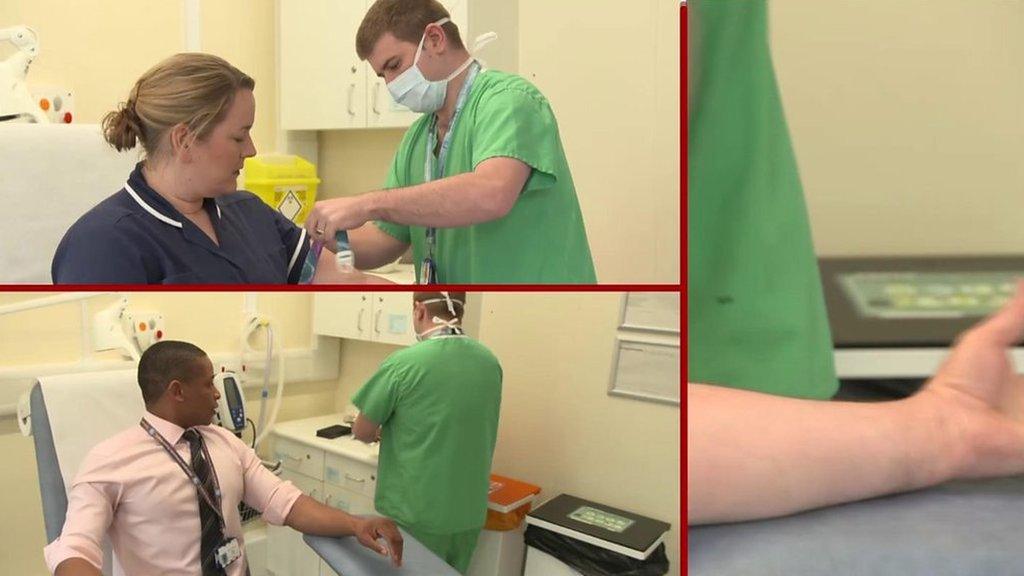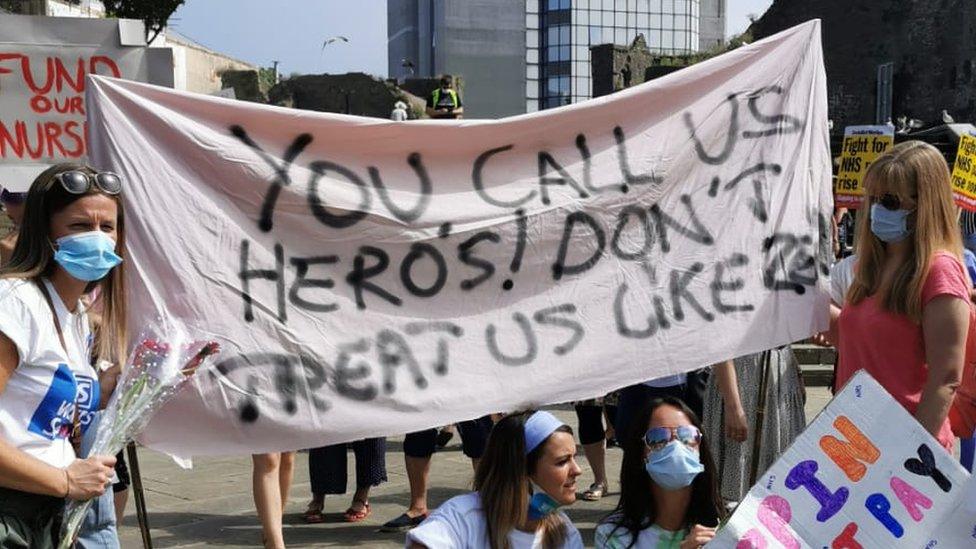Coronavirus: NHS sickness highest on record at pandemic's start
- Published

NHS Wales' staff sickness in the early stages of the coronavirus pandemic was the highest on record.
The sickness rate in the three months to March was 6% - up 0.4% on the same time in 2019 - the highest since data began being collected in 2008, external.
Those self-isolating were not counted in the figures, which cover the period just before April's coronavirus peak.
The Welsh Government said it took NHS staff wellbeing "extremely seriously" and offered help to reduce sick rates.
In a report, it said March saw the highest-recorded monthly rate, adding that given the timing it was "more than likely attributed to Covid-19".

Despite being only one of two areas of the NHS to show a decrease in sickness, the Welsh Ambulance Services NHS Trust still had the highest rate - 7.1% compared to the Wales average of 6%.
The absence rate is calculated by taking the number of sick days and dividing it by the total number of days available for each area of the NHS.
Healthcare assistants and support workers had the highest absence rate in any one staff group at 8%, followed by ambulance workers (7.5%) and nurses, midwives and health visitors (7.2%).
Sickness rates have never fallen below 5% for this quarter in the past decade and climbed in recent years from 5.1% in 2016 to 5.6% in 2019.

'We feel guilty being off'

Alison Magor has been a district nurse for 15 years
Alison Magor, 56, is a district nursing sister who manages a team in Cwmbran. She caught coronavirus in March and was off work for the best part of five weeks.
"It's quite frightening having Covid," she said.
"We all think that we know what it's like to have flu and to have viruses, but to be so very, very short of breath and to be so fatigued, to be so tired [and] not want to eat, not want to drink."
Ms Magor said the health board and her colleagues had done everything possible to ensure "stringent" safeguards had been in place at the time she caught the virus, and praised them for their support.
But being away from work made her feel bad about not being able to help.
"All you do is think about your team. How are they doing? How are they coping?
"We all feel guilty in the NHS if we're off, because that's one man down. That's another person who's not there to help carry the load. It is it what it is - you know you can't help it."
Ms Magor said she currently has a member of staff off waiting for the result of a Covid-19 test and she was emailing in every day, anxious about being absent.
"I said 'don't worry about it, you'll know when you get the test back. Just look after yourself'," she added.
"I'm very proud of my team because the minute that everybody is well enough to come back in, they've been back in work."


Nicky Hughes said the pandemic had affected NHS workers' mental health after some became patients themselves
Nicky Hughes, of the Royal College of Nursing (RCN), said she expected to see the sickness rate get worse when the figures for the next quarter are released - which will include the peak of the virus in April.
She said: "I would imagine we would see a spike in those weeks before testing came in and we had huge circulation in the community."
Ms Hughes, the RCN's associate director of nursing for employment relations, said the one change that would have made the biggest difference to managing staff sickness would have been an earlier rollout of testing of NHS staff.
'We called for testing earlier'
Wales' health minister announced front-line NHS staff would be screened from 18 March.
"We called for testing to be brought in at an earlier stage, we had staff who had symptoms - it could have been coronavirus, it could have been a common cold," said Ms Hughes.
"We had members saying: 'If I could have a test, I could get back to my workplace.'
"If we had testing sooner, we may have been able to help get people back to work quicker."
While the ambulance service had the highest sickness absence rate of any trust (7.1%), this fell by 0.4% for the equivalent period in 2019.
Helen Watkins, the Welsh Ambulance Service's deputy director of workforce and organisational development, said: "The very nature of ambulance work means that the wellbeing of our staff is pushed to the limit, physically and emotionally.
"Our sickness absence figures are not where we want them to be, but we're one of two organisations across NHS Wales that have actually improved compared to the same period last year, and are encouraged that they're moving in the right direction."

The union Unison said health services would need to wait until later in the year for a "much clearer picture of the impact of Covid on the NHS Wales".
Regional secretary Tanya Palmer added: "Looking after very sick patients during the Covid public health emergency placed an unimaginable mental and physical toll on Welsh healthcare workers and their social care colleagues.
"Many became ill and devastatingly, some paid with their lives helping others.
"The challenge was unprecedented in their careers. Dealing with the scale of death when patients' families could not be present is likely to leave a lasting impact and we know many will suffer post-traumatic stress disorder.
"There is a duty on their employer and government to provide these workers with every support they need."
A Welsh Government spokesman said: "We take NHS staff health and wellbeing extremely seriously and support NHS Wales to reduce sickness rates.
"This includes the Corporate Health Standard for staff and providing a range of extra support during the pandemic, including over £1m for mental health support.
"We expect some variance from year to year in sickness levels. We prioritised NHS staff testing as soon as the tests became available and moved quickly to increase testing capacity."
- Published5 May 2020

- Published8 August 2020

- Published18 August 2020

- Published16 April 2020
